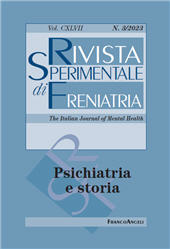The Use of Oral History in Researching Psychiatry's Past
P. 103-118
Oral history has become firmly established as a method to delve into and bring to light the experiences and viewpoints of individuals who have been suppressed or marginalised in the history of psychiatry and mental healthcare. This article aims to provide an overview of the ways in which oral history has been deployed, both as a method and as a source, to address the absence of voices and the silences that continue to persist within the history of mental healthcare in the British context. The article argues for the relevance of oral history methodology to the history of psychiatry in restoring and amplifying the voices of the less powerful.
The article will evidence how the collection of and re-use of oral histories of those at the receiving end of mental healthcare, and of those who provide it, has the potential to promote democratic relations in mental healthcare research by challenging traditional power relations in what historically has constituted the history of psychiatry. It has the power to bring to the fore the perspectives of key actors, particularly those with serious, long-term mental health conditions who remain under-served all along throughout the long history of mental healthcare, albeit in different ways. The article will show how oral history methodology can broaden the history of psychiatry and mental healthcare by addressing and redressing the silences and erasures therein in a range of disciplinary contexts and perspectives. [Publisher's text]
La storia orale si è saldamente affermata come metodologia per approfondire e portare alla luce le esperienze e i punti di vista di individui che sono stati soppressi o emarginati nella storia della psichiatria e della salute mentale. Questo articolo si propone di fornire una panoramica dei modi in cui la storia orale, sia come metodologia che come fonte per la ricerca del passato, è stata impiegata nel contesto britannico per affrontare le assenze di voci ed i silenzi che continuano a persistere all'interno della storia dell'assistenza psichiatrica. L'articolo sostiene la rilevanza della metodologia della storia orale per la storia della psichiatria nel ripristinare e amplificare le voci dei più fragili.
L'articolo mette in evidenza come la raccolta e il riutilizzo delle storie orali di coloro che ricevono assistenza psichiatrica e di coloro che la forniscono ha il potenziale di promuovere relazioni democratiche nella ricerca sulla salute mentale, sfidando le tradizionali relazioni di potere in ciò che storicamente ha costituito la storia della psichiatria. Le testimonianze orali offrono l'opportunità di mettere in rilievo le prospettive degli attori chiave, in particolare le persone con disturbi gravi e persistenti, generalmente svantaggiati/ poco rappresentati nella storia dell'assistenza psichiatrica, in vari modi. L'articolo mostra come la metodologia della storia orale possa ampliare la storia della psichiatria e della salute mentale affrontando e correggendo i silenzi e le assenze in essa contenuti in una serie di contesti e prospettive disciplinari.[Testo dell'editore]
Forma parte de
Rivista sperimentale di freniatria : la rivista dei servizi di salute mentale : CXLVII, 3, 2023-
Artículos del mismo número (disponibles individualmente)
-
Información
Código DOI: 10.3280/RSF2023-003009
ISSN: 1972-5582
MATERIAS
KEYWORDS
- storia orale; testimonianze orali; storia della psichiatria; archivi di storia orale; istituzioni psichiatriche; riutilizzo della storia orale, studi della memoria
- oral history; history of psychiatry; oral history archives; psychiatric institutions; re-use of oral history; memory studies


